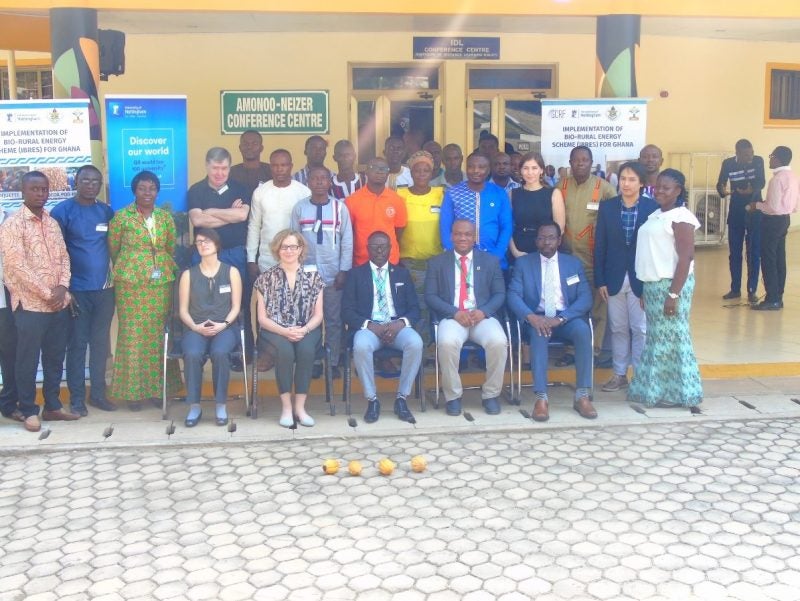
Recent estimates by the United States Agency for International Development show that Ghana has a total installed energy capacity of 4,399MW, with a total access rate of 83%. But this figure is misleading, as power reaches 91% in urban areas and just 50% of those in the countryside. The solution to closing the gap, the University of Nottingham believes, is through decentralised energy systems. Step forward cocoa bean husk power.
Using cocoa bean husks as a source of power is the idea of professor of storage technologies at Nottingham Jo Darkwa, who saw the potential in the massive amount of waste produced by cocoa bean farmers. According to Darkwa, some 800,000 metric tonnes of cocoa bean waste is produced, waste that is often simply left to rot.
Once the project is up and running rural communities will be able to produce their own biofuel by burning the cocoa husks in a bio-power electricity generation unit, which is then converted into electricity through a gasification system formed of a gasifier and the 5kW generation unit.
The scheme has been sponsored by the UK government’s global challenge research fund (GCRF), who awarded it £250,000 in March 2019. The GCRF is a £1.5bn fund established in 2015 for research focused on addressing challenges in the developing world.
Darkwa works with a team of fellow professors and researchers from University of Nottingham, including assistant professor in building engineering John Calautit and Karen Moore from the faculty of social sciences for the project.
Building cooperatives and biofuel
The project began in late 2018, when the team began a series of feasibility studies to examine the energy densities of four different types of cocoa beans found in the 60 regions of Ghana. Once collected, the samples were taken to Nottingham for scientific analysis to classify them by different levels and groups.
Alongside the scientific analysis, Darkwa and the University of Nottingham team also organised workshops with local communities in rural areas. The team collaborated with groups on the ground such as Ghana Cocoa Board and universities like the Kwame Nkrumah University of Science and Technology. Thus far the scheme has been well received by the communities the scheme hopes will benefit, as the rural communities will form an integral part of the project.
The Ghanaian government has also encouraged the scheme and created a number of publicity campaigns, but Darkwa insists that the “ultimate benefit will be for the rural communities and not for government departments.”
Once all scientific and social studies are completed, and after the demonstration project, which will run for a year, the scheme will hopefully be implemented. Utilising the fact that in Ghana there are generally 20 to 30 cocoa producing farms and villages surrounding a medium sized town, two or three of these towns will act as ‘hubs’ in each region of the country to coordinate with the isolated communities.
Husks and dreams
The possibilities that come from having stable access to electricity in rural areas are plentiful. Firstly, Darkwa hopes that the electricity generated will be put to use storing vaccines, as they have a short life span and need to be kept in a certain temperature range.
Along with storing vaccines, food would be able to be stored for longer. Other things that many take for granted like communications, lighting and the internet would also be up and running in these communities.
However, Darkwa believes the key objective of this scheme is for the people to control the means of production through cooperatives. These cooperatives will work through division of labour, as he explains: “The cooperatives will be responsible for different aspects of the processes. Some will be responsible for collecting waste from the farms, some will be responsible for ensuring the raw materials are dried properly, some will be responsible for breaking them down into the sizes that are relevant for the classification for the plant to use. All of these activities will start to create some form of income generating activities for them.”
The initial demonstration project is expected to last one year, with full implementation to hopefully follow shortly after so that the “momentum can be maintained, making sure rural communities have that feel good factor because the expectation is that something good is coming.”
Interest in the project is also growing in Ghana’s neighbour, and world’s leading cocoa bean producer – Ghana is number two – the Ivory Coast. Darkwa hopes that the Ghanaian business community will also take an interest in promoting and funding the scheme.
“The impact factor is huge,” said Darkwa. “A number of people can be removed from the poverty levels, which causes premature deaths that could be prevented. The impact factor goes beyond anything as you’re talking about life and the future, and this future goes beyond this period we are talking about. That is the ultimate level of satisfaction.”
Will the burning of cocoa create any unforeseen environmental issues? That remains to be seen but the project leader can confirm burning does not give off a significant smell, and it’s definitely not chocolatey.



